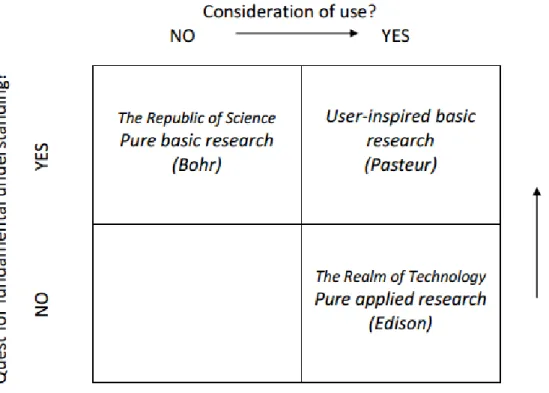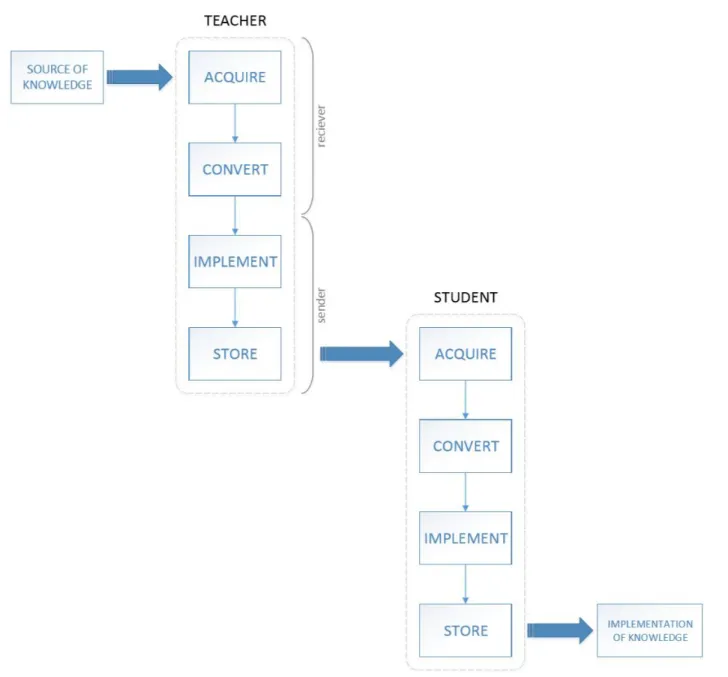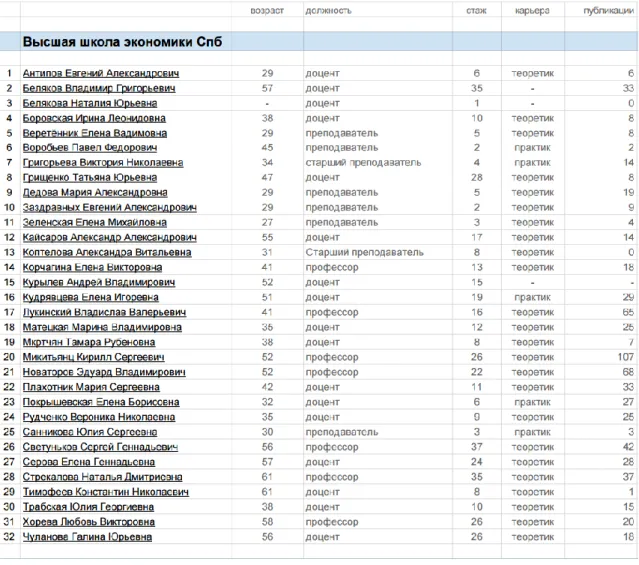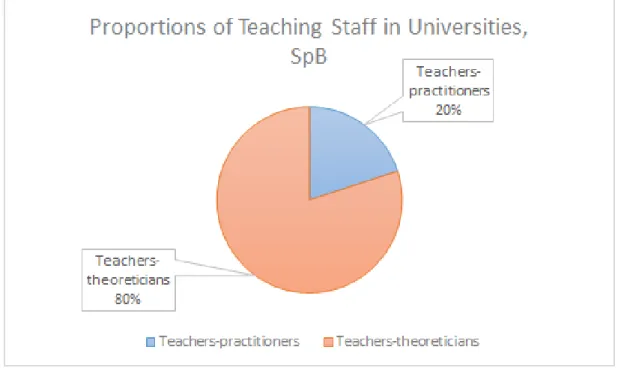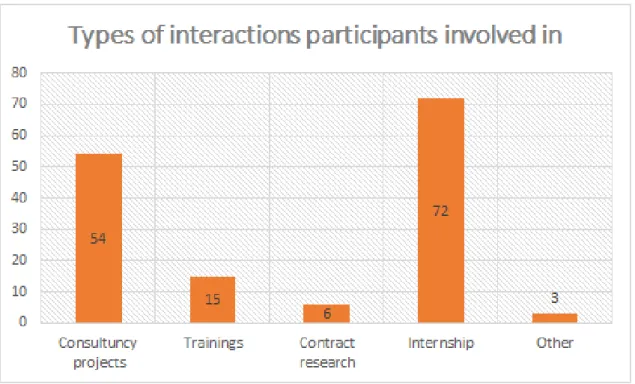The results of the research show that there is a lack of acquisition of practical knowledge by students in the process of receiving business education in universities. Messenger - person or organization that disseminates information to the audience - Evaluation - explanation of the purpose and potential effect of Knowledge Transfer and Exchange.

A knowledge transfer perspective on the research and teaching in higher education
In case of misunderstanding message by all parties involved in Knowledge Transfer, this process becomes useless. Motivating students and staff towards knowledge transfer to create R&T linkages.
The Concept of Knowledge Acquisition
13 Finally, we can say that research-based education is at the heart of the transfer of research to education to prepare qualified specialists and individuals capable of continuing the process of knowledge transfer. This appears to be unethical and one party in the knowledge transfer process needs to eliminate this flaw in their studies and cases.
Overview the role of Universities in Growth and Productivity
Background
Universities and regional innovation ecosystems
Alliance Universities are sector leaders in rising mobility and absorptive capacity
Information Exchange between Academics and Business, Public and Third sectors
- Main concept
- Interaction between Academic and External Organisation
- Modes of interaction and factors affecting the choice
- Further Information
There is an agreement between the university and external organization regarding future rights and titles to the technology or project. Moreover, technology transfer is one of the main aspects of the knowledge exchange process.
Knowledge exchange in dialog with SMEs, government and higher education
The LEAD program in UK
When we talk about the relationship between academics and business, we must emphasize that it takes time to understand the parts of the relationship to align goals and interests, and even more time and energy to integrate the parts into trust. 20 Smith's article focused on three main aspects, namely knowledge sharing in dialogue between government, university and SMEs, innovation in this process and innovation as a result of leadership development.
LEAD role in knowledge exchange
Russian Practices of Knowledge Exchange between Universities and SMEs
Vision on the perspectives of economic development
Due to the fact that the high costs of innovative technologies are created, new technologies must be strongly connected with their adaptation and monetization, because there is a risk of adaptation of these technologies from other sides that have not been involved in the development. Technology diffusion is also a key aspect in this issue due to the fact that sharing new technologies with the regional and national companies has a positive effect on the economic situation in the country.
A Regional Approach of Industry Restructuring in Tomsk Region
For the first time, it is the participation of Timsko representatives in work and business processes in the industry, but it seems ineffective. Kisselev (2008) believes that "one of the most promising" is the integration of different innovation structures, such as technoparks, innovation centers and federal organizations in the region.
Technoparks and its’ impact in Information Exchange
23 Technoparks in the full sense of this word, but has, for example, many common features. The main goal of technopark is to support small and medium-sized enterprises in the country.
Knowledge exchange and acquisition gap
In March 2006, the Russian government adopted the program of development of technoparks in the country, according to which they should appear in a variety of regions. Technopark here is the special area complex with a high technology level of organizations involved in cooperation with the main goal of development, commercialization and adaptation of innovations.
Research gap and research questions
According to the literature review, it is understood that the least researched topic in the term of Knowledge Transfer Process and Problems of Knowledge Acquisition is the Lack of practical Knowledge in Universities that students can get (Figure 4). Lack of practical knowledge in universities does not appear to be the problem of interaction between administration and business organizations in terms of knowledge transfer, but also the problem relates to the teachers' preparation and students' attitude to this issue. Lack of interaction between teachers and business organizations causes the lack of practical knowledge of teachers and then in the Universities.
Lack of interaction between students and business organizations also leads to the problem of practical preparation of students and knowledge realization and implementation. Is there enough practical knowledge that students get from the knowledge acquisition process in the University in case of a lack of teacher-practitioners. What are the problems of students and teachers in Knowledge interaction processes with business organizations.
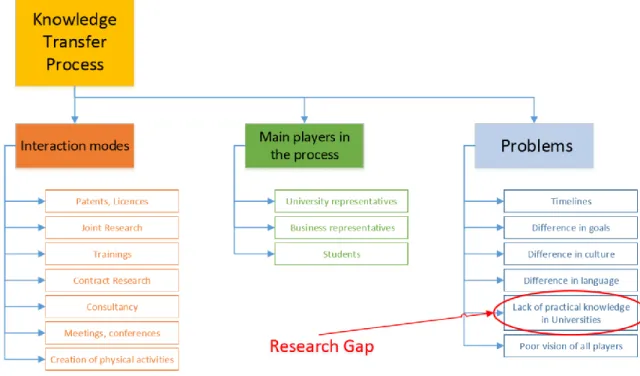
Summary of Chapter 1
RESEARCH FRAMEWORK FOR ANALYZING BARRIERS IN KNOWLEDGE TRANSFER AND
- Research Methodology
- Content Analysis of Teaching Staff
- Qualitative Interviewing with Teachers of Business Schools
- Survey Among Students Studying Management and Business Disciplines
What role, in your opinion, does a teacher from the University play in the process of knowledge exchange between student and business organisations. 39 I think the teacher plays an important role in the preparation process of students for further work. It supposes to be a teacher, plays an important role in the preparation process of student for the further.
Moreover, there are more teacher-theoreticians than teacher-practitioners in the University (this will be described in Chapter 3 based on the content analysis). This question helps to understand whether students tend to continue their studies at the University or not. This is one of the reasons why there are more teacher-theoreticians than teacher-practitioners in the universities.
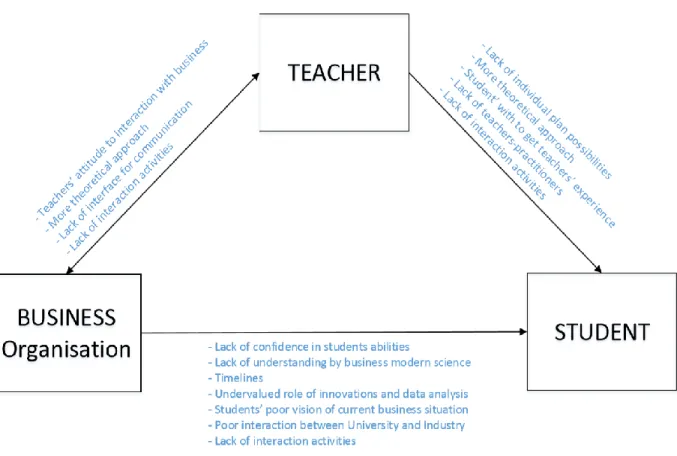
Summary of Chapter 2
MAIN FINDINGS ON THE KNOLEDGE EXCHANGE AND ACQUISITION
- Content analysis results
- Interview findings
- Survey results
- Managerial implications
- Limitations and future studies
Under these circumstances, the question of whether the teacher plays an important role in the process of knowledge exchange becomes more acute. On the second case, teachers involved in knowledge exchange processes such as consulting, research, business data analysis are already in the group of teacher-practitioners. 40% (36 out of 90) in the middle, which means that they are not sure if they have enough practical knowledge and it is obvious that they require more opportunities for knowledge exchange.
Based on the collected results of this study and all possible features of the Knowledge Transfer Process, it can be clearly seen that the problem in interactions is the fault of all parties involved in the process. The purpose of this study was to understand the impact of the teacher-practitioner ratio on the level of students' practical preparation. First of all, in the case of the business strategy simulation interface in the knowledge transfer process, there would be one more pair (Figure 18).
This interface can solve the problem of lack of practical knowledge in universities by allowing students to work in virtual business environment created by themselves. Moreover, it can solve the problem of lack of practical knowledge in universities and poor practical background of teachers, overcome the obstacle of reluctance to transfer knowledge and interact with academia from business organizations.
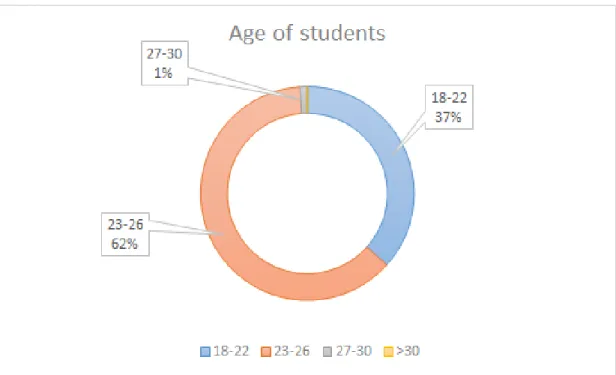
Summary of Chapter 3
58 Speaking of future research, it would be reasonable to do a deeper analysis of the teaching staff by analyzing the teaching style, all activities and CVs and base on a larger sample than this study did. In fact, this study only analyzes the problem from the bias of students and teachers, but future research is needed to create a more detailed picture of barriers in the interaction between industry and academia to analyze business organizations. Finally, analysis of the advantages and disadvantages of launching the business simulation interface, which this study offers as one of the possible solutions, is an important side of future studies.
59 One of the most interesting solutions suggested in this study is the creation of the simulation interface analog of international business strategy. Finally, the limitations of this study were reviewed and recommendations for future studies were listed in the last paragraph. According to these recommendations, the future researcher can organize his/her study in such a way to cover this topic more deeply and analyze the larger sample for more reliable results.
CONCLUSION
- How do you understand the term “Knowledge Exchange”?
- What role, to your mind, a teacher of University plays in the process of knowledge exchange between student and business organisations?
- What are you doing in order to be up to date with current business situation on the market?
- What knowledge exchange processes are you involved in? (consultancy projects, contract researches, trainings…)
- What do you think the problem of knowledge exchange between students and industry?
- How old are you?
The teacher should give the student the idea that not only will the organization give the student specific knowledge for their market, but more importantly, the student should show what they can bring. First of all, thanks to the help of the teacher, the student must master new methods, research results, etc. I am interested in news from some markets that interest me (real estate), but not deeply.
What knowledge sharing processes are you involved in? consulting projects, contract research, training...) contract research, training...). Sometimes - I conduct trainings (1-2 times a year), weekly - contract studies, data analysis for companies (evaluation of the effectiveness of the new menu, analysis of interrogation data, etc.). Often, there is a lack of understanding among business organizations about the possibilities of modern science (data science, management science, etc.), the role of experiments, data analysis, etc.
Bespalov
- So in this case you take yourself as a teacher-practitioner?
- What do you think the problem of knowledge exchange between students and industry?
- In case there are those, in your opinion, what obstacles in process of knowledge exchange with business organisations teacher of University can face to?
- How old are you?
- What knowledge exchange processes are you involved in? (consultancy projects, contract researches, trainings…)
- What do you think the problem of knowledge exchange between students and industry?
If there are them, in your opinion, what obstacles in the knowledge process. exchange with business organizations teachers at the university can face. Additionally, not all business organizations are ready to work with students at the early stages of their careers. In the event that there are those, in your opinion, what obstacles in the process of knowledge exchange with business organizations can university teachers face. exchange with business organizations teachers at the university can face.
I suspect that this is the problem of teachers in general, because they often behave conservatively and do not want to come into contact with professional organizations. What role, in your opinion, does a university teacher play in the process of knowledge exchange between students and business organizations. exchange between students and business organisations. In my opinion, it is impossible to get business organizations involved in the training process.
Hassan N, Hayiyusuh N, Nouri R., (2013) "The Implementation of a Knowledge Management System (KMS) for Humanitarian/Disaster Support". Lewis, J., (2006) "Building Order in a Controversial Disorder: Using Online Support Groups in Social Science Research". Mason, J., (2006) “Six Strategies for Mixing Methods and Linking Data in Social Science Research, Real-Life Methods” NCRM Node Working Paper.
McQueen, M., (2015) "Ethical Issues of Knowledge Organization in Designing a Metadata Schema for the Leo Kottke Archives". Nasuti, W., (2010) "Knowledge acquisition using multiple domain experts in the design and development of an expert system for disaster recovery planning". M., “Innovation in teaching and learning: knowledge exchange in dialogue with SMEs, government and higher education”, Available online:.
